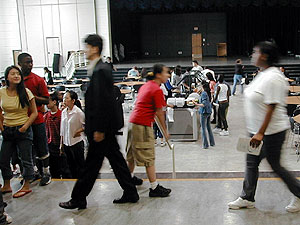|
Audio
Photos
More from MPR
Your Voice
|
St. Paul school levy won't solve budget problems
June 5, 2003
 |
| Students fill the cafeteria at St. Paul's Arlington High School. (MPR Photo/Tim Pugmire) |
St. Paul, Minn. — Minnesota school boards must finalize their budgets for the coming year by the end of June. In St. Paul, those budget talks are already turning to the following school year. The K-12 education financing bill recently passed by the Legislature provides no inflationary increase. Meanwhile the cost of current education programs keep rising.
 | |||
School board Chairman Al Oertwig says that could mean a $20 million deficit for the district's 2004-2005 budget. He's suggesting the school board address the issue now by cutting more than the $2.4 million needed to balance the 2003-2004 budget.
"It's my belief that we need to be thinking more than just what's the budget for next fall," Oertwig said. "How do we prepare for that shortfall? If we're going to be $20 million short in the following year, how to we start easing that transition, so that we maybe save up a little money so that we don't have to cut so much in the following year."
The St. Paul school district has seen plenty of budget cuts in recent years, even as enrollment grows in some schools. The hallways more crowded at Arlington High School, where an additional 250 students are expected in the fall.
Principal Bill Dunn says cuts in the current year's district budget, which totaled $20 million dollars, resulted in the loss of seven teaching positions at his school.
 | |||
"We made class sizes a bit larger, particularly in some of our basic standards test courses, where we targeted kids who haven't passed the test," Dunn said. "We had promised to keep those small. We didn't keep them as small."
Dunn says the cuts also meant fewer elective courses for students and less money for staff training. He says the district's proposed budget for the 2003-2004 school year will still leave him short of staff.
"It's a shame, you start talking all these numbers and things," Dunn said. "You're supposed to be teaching kids. And you start to sound like a Target manager or something, because you're so concerned about the cash flow and everything else going on, rather than teaching the kids."
Dunn describes the expected belt tightening for the coming year as merely uncomfortable, compared to the more painful cuts of recent years. Those cuts have totaled $34 million districtwide over the past three years. Last fall, voters tried to stop the financial bleeding by approving a tax levy referendum that will generate $18 million each of the next four years.
Lois Rockney, the district's finance director, says the new revenue is still not enough. "Obviously we had hoped the referendum would allow us to not have to make any reductions and to be able to continue the programs as they had been in this current school year, 2002-2003," Rockney said.
But Rockney says cuts of $2.4 million are needed to balance next year's overall budget of $550 million. She says the recommended cuts would come from various district programs. Individual school budgets would be spared. Rockney says after recent spending reductions, the cuts are getting harder to find.
"We need to at some point in time really determine what it is we want to be in the future and what it is we can do and what we can no longer do," Rockney said. "If the funding is no longer to be coming forward from the state, then we have to look at programs that we can no longer afford to do. If we just continue to do everything that we're currently doing now, and cut a little bit from it every year, pretty soon we do everything poorly."
The St. Paul school board will discuss its budget cutting options next Tuesday. A final vote to adopt the 2003-04 budget is expected June 24.
|
News Headlines
|
Related Subjects
|
